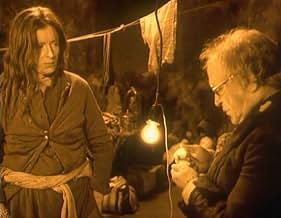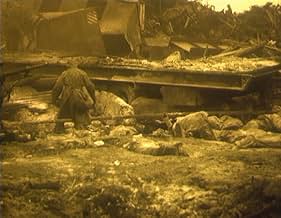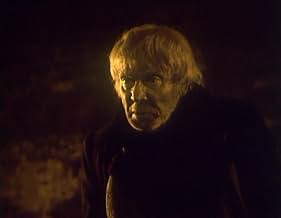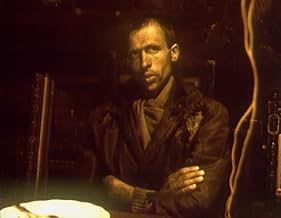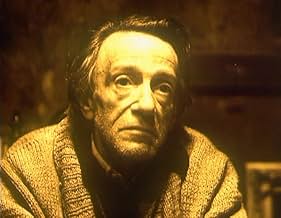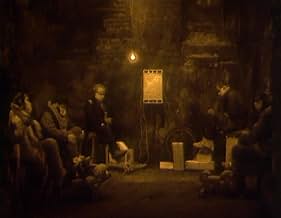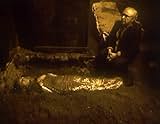Pisma myortvogo cheloveka
- 1986
- 1 घं 27 मि
अपनी भाषा में प्लॉट जोड़ेंIn the aftermath of nuclear holocaust, a group of intellectuals crave to find hope in the pale and colorless new world. Among them, a history teacher tries to contact via letters his missing... सभी पढ़ेंIn the aftermath of nuclear holocaust, a group of intellectuals crave to find hope in the pale and colorless new world. Among them, a history teacher tries to contact via letters his missing son.In the aftermath of nuclear holocaust, a group of intellectuals crave to find hope in the pale and colorless new world. Among them, a history teacher tries to contact via letters his missing son.
- निर्देशक
- लेखक
- स्टार
- पुरस्कार
- कुल 1 जीत
- Khyummel-otets
- (as I. Ryklin)
- Anna
- (as V. Mayorova)
- Pastor
- (as V. Dvorzhetskiy)
- Tereza
- (as S. Smirnova)
- Vrach
- (as Ye. Platokhin)
फ़ीचर्ड समीक्षाएं
The nuclear catastrophe, we are told, happened by accident. Most of the few remaining survivors are physically or mentally sick, going about zombie-like, and slowly dying off in a few dimly lit underground shelters. The situation above ground is even worse, with high-radiation, wreckage, rubble, strong winds and little light (some kind of "nuclear winter"), rotting corpses everywhere.
The main character is an old scientist who tries to preserve some sense of purpose, inter alia by continuing his work and by writing letters to his missing and most likely dead son, letters that are not sent because there is no address to send them to. The acting by R. Bykov who plays the scientist, is impeccable, and the same goes for the rest of the cast, although it seems out of place to think and comment on these matters in a film dominated by sheer horror.
The limited colour gamma used (mostly dirty ochres, greys and blacks) effectively reinforce the feeling of oppression and hopelessness this film so effectively conveys from beginning to end.
Very hard and painful to watch, but perhaps necessary to get an idea of what our world could look like, were we to use the horrific weapons we have created. Did in fact look like, for some, when these weapons were used at the end of WWII.
The story revolves on Rolan Bykov as a scientist – former Nobel Price winner, even – who entrenched himself underneath the remnants of a library building along with his wife and a handful of co-workers. The titular letters are addressed to his son whom the scientist hasn't seen or heard from since the catastrophe. The letters and above all the hope his son is still alive somewhere is what keeps the poor man going, but how long can you hold on to hope when you see everything and everyone around you dying? "Letters from a Dead Man" is a difficult but ultimately very rewarding cinematic experience to endure. Difficult, of course, because of the emotionally devastating imagery and atmosphere, and because there's actually very little substantial content. We literally stare at a handful of people languishing and eventually dying, with only a small hint at hope near the end. And rewarding because of the depiction of genuine humane sentiments and the thought-provoking messages. It's also highly remarkable how "Letters from a Dead Man" remains continuously vague regarding the cause of the apocalypse and eventually even searches the guilt in the own heart. In a time where movies released on the other side of the Iron Curtain (in Europe and particularly the USA) routinely blamed Russia for the potentially upcoming apocalypse, this tale suggests the root cause of the catastrophe lies in a human error during the launch of a space shuttle. The entire cast gives away tremendous performances. I don't know if these people are veteran actors and actresses in their home countries, but their grimaces and catatonic behavior suggest that they were selected especially for this type of discouraging parable. Fantastic film; though obviously not fit for all occasions and/or audiences.
This movie is a warning. It is scary to think how many times the world was on the verge of the Apocalypse. Not the divine Apocalypse, but one that can fly on the wings of a rocket launched by a foggy enemy.
Rolan Bykov, I was once again convinced of this, one of the best actors of Soviet cinema. He so organically played the role of the "Dead" ... well, what can I say? Master!
The letters that the hero of Bykov (incidentally, a professor who received the Nobel Prize) writes to his late son, only reinforce the already gloomy atmosphere of the film.
But, nevertheless, there is some optimism in the film. What can not but rejoice. However, I was insincere when I said that the film sucked all the positive emotions out of me. One more thing remains: hope. Part of me hopes that one day we will wake up and the world will no longer have nuclear weapons. But the other part, however, understands that a world without nuclear weapons is the world that is discussed in this film. This is a world in which there is nothing that holds back human destructive nature.
A scary movie ... hopefully not prophetic.
<b id="_d">...</b>
क्या आपको पता है
- ट्रिवियाThe filmmakers took great care to continuously remind their viewers that what they're seeing is not happening in the Soviet Union. To ensure this, a lot of foreign items have been placed in the backgrounds which surely immediately caught the eye of the contemporary viewer. There is not a single object with Cyrillic letters, but there are plenty with English ones. Many items are Western consumer goods which were rare in the Soviet Union in the 1980s. Particular examples are beer cans and a bottle of Jagermeister on a desk. The weapons the soldiers wield are also not even resembling Soviet rifles which would've been familiar to all viewers who completed their military services. They look more like a strange "crossbreed" of American M-16 and M-1 rifles. The vehicle the soldiers are using is a MAZ missile trailer truck, but the same vehicle was also built for the civilian market and sold to many countries. The helicopter that shows up in one of the scenes is a Kamov Ka-26 which was never used by the Soviet military (and in fact only one Warsaw Pact country did, Hungary). The hovercraft that is seen turning and leaving is also not a (known) military vehicle, but anyone in the 1980s should've associated the image with the air-cushion ferries on the English Channel which were a famous and novel technical achievement at the time.
- भाव
Unknown: We should acknowledge the fact that the whole history of mankind is a story of a slow suicide commited by a living matter that by sheer accident acquired the abilty to think, but that did not know what to do with this fateful capacity. Full stop.
- कनेक्शनFeatured in TopTenz: 10 Little Known But Genuinely Disturbing Films About Nukes (2018)
टॉप पसंद
- How long is Dead Man's Letters?Alexa द्वारा संचालित
विवरण
- चलने की अवधि
- 1 घं 27 मि(87 min)
- रंग
- ध्वनि मिश्रण
- पक्ष अनुपात
- 1.37 : 1

